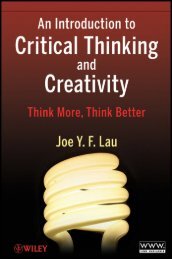- Page 4:
“ What always amazes me about Dav
- Page 8:
Brand Relevance
- Page 14:
Copyright © 2011 by John Wiley & S
- Page 20:
Contents Preface xiii 1. Winning th
- Page 24:
CONTENTS xi Does the Offering Have
- Page 28:
Preface During the last ten years,
- Page 32:
PREFACE xv There are dozens of othe
- Page 36:
You do not merely want to be consid
- Page 42:
2 BRAND RELEVANCE whereas the other
- Page 46:
4 BRAND RELEVANCE and being the num
- Page 50:
6 BRAND RELEVANCE Figure 1.2 The As
- Page 54:
8 BRAND RELEVANCE new tools, a new
- Page 58:
10 BRAND RELEVANCE The fi rst and m
- Page 62:
12 BRAND RELEVANCE There are a host
- Page 66:
14 BRAND RELEVANCE Figure 1.3 Brand
- Page 70:
16 BRAND RELEVANCE differentiation,
- Page 74:
18 BRAND RELEVANCE the competitor
- Page 78:
20 BRAND RELEVANCE the one UPS has
- Page 82:
22 BRAND RELEVANCE to some other st
- Page 86:
24 BRAND RELEVANCE A major risk is
- Page 90:
26 BRAND RELEVANCE The New Brand Ch
- Page 94:
28 BRAND RELEVANCE In the case of a
- Page 98:
30 BRAND RELEVANCE the brand role m
- Page 102: 32 BRAND RELEVANCE innovation. Or t
- Page 106: 34 BRAND RELEVANCE into a sustainab
- Page 110: 36 BRAND RELEVANCE newness (defi ne
- Page 114: 38 BRAND RELEVANCE A highly differe
- Page 118: 40 BRAND RELEVANCE champions of the
- Page 122: 42 BRAND RELEVANCE These works and
- Page 126: 44 BRAND RELEVANCE and transformati
- Page 132: 2 UNDERSTANDING BRAND RELEVANCE Cat
- Page 136: UNDERSTANDING BRAND RELEVANCE 49 ch
- Page 140: UNDERSTANDING BRAND RELEVANCE 51 ex
- Page 144: UNDERSTANDING BRAND RELEVANCE 53 Th
- Page 148: UNDERSTANDING BRAND RELEVANCE 55 Cu
- Page 152: UNDERSTANDING BRAND RELEVANCE 57 Th
- Page 158: 60 BRAND RELEVANCE pen with a lesse
- Page 162: 62 BRAND RELEVANCE Consideration Se
- Page 166: 64 BRAND RELEVANCE for example, a c
- Page 170: 66 BRAND RELEVANCE come to mind whe
- Page 176: 3 CHANGING THE RETAIL LANDSCAPE I d
- Page 180: CHANGING THE RETAIL LANDSCAPE 71 cl
- Page 184: CHANGING THE RETAIL LANDSCAPE 73 fr
- Page 188: CHANGING THE RETAIL LANDSCAPE 75 lo
- Page 192: CHANGING THE RETAIL LANDSCAPE 77 Be
- Page 196: CHANGING THE RETAIL LANDSCAPE 79 it
- Page 200: CHANGING THE RETAIL LANDSCAPE 81 Cr
- Page 204:
CHANGING THE RETAIL LANDSCAPE 83 by
- Page 208:
CHANGING THE RETAIL LANDSCAPE 85 na
- Page 212:
CHANGING THE RETAIL LANDSCAPE 87 Su
- Page 216:
CHANGING THE RETAIL LANDSCAPE 89 Ve
- Page 220:
CHANGING THE RETAIL LANDSCAPE 91 Ot
- Page 224:
CHANGING THE RETAIL LANDSCAPE 93 Th
- Page 228:
CHANGING THE RETAIL LANDSCAPE 95
- Page 234:
98 BRAND RELEVANCE minivan, GM ’
- Page 238:
100 BRAND RELEVANCE resulted in a d
- Page 242:
102 BRAND RELEVANCE these cars woul
- Page 246:
104 BRAND RELEVANCE Figure 4.1 The
- Page 250:
106 BRAND RELEVANCE and substantial
- Page 254:
108 BRAND RELEVANCE Competitors wer
- Page 258:
110 BRAND RELEVANCE The Chrysler Mi
- Page 262:
112 BRAND RELEVANCE introduction, C
- Page 266:
114 BRAND RELEVANCE 1997 that was v
- Page 270:
116 BRAND RELEVANCE model, it was t
- Page 274:
118 BRAND RELEVANCE models. It was
- Page 278:
120 BRAND RELEVANCE advantage. Even
- Page 282:
122 BRAND RELEVANCE as 1989, when E
- Page 286:
124 BRAND RELEVANCE Key Takeaways
- Page 290:
126 BRAND RELEVANCE “ aha! ” ex
- Page 294:
128 BRAND RELEVANCE In addition to
- Page 298:
130 BRAND RELEVANCE the resulting t
- Page 302:
132 BRAND RELEVANCE In 1977 another
- Page 306:
134 BRAND RELEVANCE Nabisco Cookies
- Page 310:
136 BRAND RELEVANCE Oreo Thin Crisp
- Page 314:
138 BRAND RELEVANCE The decision to
- Page 318:
140 BRAND RELEVANCE 150 studies to
- Page 322:
142 BRAND RELEVANCE only a partial
- Page 326:
144 BRAND RELEVANCE dominated in te
- Page 330:
146 BRAND RELEVANCE designed for an
- Page 334:
148 BRAND RELEVANCE its various for
- Page 338:
150 BRAND RELEVANCE fi nally, in mi
- Page 342:
152 BRAND RELEVANCE Figure 5.2 Heal
- Page 346:
154 BRAND RELEVANCE and subcategori
- Page 352:
6 FINDING NEW CONCEPTS The best way
- Page 356:
FINDING NEW CONCEPTS 159 only linke
- Page 360:
FINDING NEW CONCEPTS 161 for produc
- Page 364:
FINDING NEW CONCEPTS 163 Where did
- Page 368:
Concept Generation FINDING NEW CONC
- Page 372:
FINDING NEW CONCEPTS 167 context an
- Page 376:
FINDING NEW CONCEPTS 169 What can a
- Page 380:
FINDING NEW CONCEPTS 171 do so. The
- Page 384:
FINDING NEW CONCEPTS 173 equipment
- Page 388:
FINDING NEW CONCEPTS 175 • Prophe
- Page 392:
FINDING NEW CONCEPTS 177 Observatio
- Page 396:
FINDING NEW CONCEPTS 179 LEGO const
- Page 400:
FINDING NEW CONCEPTS 181 hidden and
- Page 404:
FINDING NEW CONCEPTS 183 External s
- Page 408:
FINDING NEW CONCEPTS 185 organizati
- Page 412:
FINDING NEW CONCEPTS 187 did not re
- Page 416:
FINDING NEW CONCEPTS 189 the produc
- Page 420:
FINDING NEW CONCEPTS 191 course is
- Page 424:
FINDING NEW CONCEPTS 193 The challe
- Page 428:
Key Takeaways FINDING NEW CONCEPTS
- Page 434:
198 BRAND RELEVANCE The prospects o
- Page 438:
200 BRAND RELEVANCE leaning. It exp
- Page 442:
202 BRAND RELEVANCE Figure 7.1 Thre
- Page 446:
204 BRAND RELEVANCE had a smaller p
- Page 450:
206 BRAND RELEVANCE particularly ri
- Page 454:
208 BRAND RELEVANCE boring. Perhaps
- Page 458:
210 BRAND RELEVANCE can change the
- Page 462:
212 BRAND RELEVANCE Furthermore, mo
- Page 466:
214 BRAND RELEVANCE actually purcha
- Page 470:
216 BRAND RELEVANCE initiative. An
- Page 474:
218 BRAND RELEVANCE Home Depot, fou
- Page 478:
220 BRAND RELEVANCE to happen. The
- Page 482:
222 BRAND RELEVANCE focus on how to
- Page 486:
224 BRAND RELEVANCE Recall how info
- Page 492:
8 DEFINING AND MANAGING THE CATEGOR
- Page 496:
DEFINING AND MANAGING THE CATEGORY
- Page 500:
DEFINING AND MANAGING THE CATEGORY
- Page 504:
DEFINING AND MANAGING THE CATEGORY
- Page 508:
DEFINING AND MANAGING THE CATEGORY
- Page 512:
DEFINING AND MANAGING THE CATEGORY
- Page 516:
DEFINING AND MANAGING THE CATEGORY
- Page 520:
DEFINING AND MANAGING THE CATEGORY
- Page 524:
DEFINING AND MANAGING THE CATEGORY
- Page 528:
DEFINING AND MANAGING THE CATEGORY
- Page 532:
DEFINING AND MANAGING THE CATEGORY
- Page 536:
DEFINING AND MANAGING THE CATEGORY
- Page 540:
DEFINING AND MANAGING THE CATEGORY
- Page 544:
DEFINING AND MANAGING THE CATEGORY
- Page 548:
DEFINING AND MANAGING THE CATEGORY
- Page 552:
DEFINING AND MANAGING THE CATEGORY
- Page 556:
DEFINING AND MANAGING THE CATEGORY
- Page 560:
DEFINING AND MANAGING THE CATEGORY
- Page 564:
DEFINING AND MANAGING THE CATEGORY
- Page 568:
DEFINING AND MANAGING THE CATEGORY
- Page 572:
DEFINING AND MANAGING THE CATEGORY
- Page 578:
270 BRAND RELEVANCE computers. Tech
- Page 582:
272 BRAND RELEVANCE his help in bri
- Page 586:
274 BRAND RELEVANCE heritage, its p
- Page 590:
276 BRAND RELEVANCE Figure 9.2 Crea
- Page 594:
278 BRAND RELEVANCE Delivering an o
- Page 598:
280 BRAND RELEVANCE Brand Equity Br
- Page 602:
282 BRAND RELEVANCE always been an
- Page 606:
284 BRAND RELEVANCE resent a brand
- Page 610:
286 BRAND RELEVANCE Maine, Sam Adam
- Page 614:
288 BRAND RELEVANCE Branded Feature
- Page 618:
290 BRAND RELEVANCE a branded servi
- Page 622:
292 BRAND RELEVANCE Involving the C
- Page 626:
294 BRAND RELEVANCE Link the Brand
- Page 630:
296 BRAND RELEVANCE brand; energizi
- Page 634:
298 BRAND RELEVANCE a strong market
- Page 638:
300 BRAND RELEVANCE not only favore
- Page 642:
302 BRAND RELEVANCE This chapter wi
- Page 646:
304 BRAND RELEVANCE lingering memor
- Page 650:
306 BRAND RELEVANCE The stick - to
- Page 654:
308 BRAND RELEVANCE introducing Chi
- Page 658:
310 BRAND RELEVANCE investment is r
- Page 662:
312 BRAND RELEVANCE handicap becaus
- Page 666:
314 BRAND RELEVANCE diffi cult to a
- Page 670:
316 BRAND RELEVANCE externally sour
- Page 674:
318 BRAND RELEVANCE Branded Social
- Page 678:
320 BRAND RELEVANCE Beware of makin
- Page 682:
322 BRAND RELEVANCE their Genesis s
- Page 686:
324 BRAND RELEVANCE the Year award
- Page 692:
11 THE INNOVATIVE ORGANIZATION In m
- Page 696:
THE INNOVATIVE ORGANIZATION 329 emp
- Page 700:
THE INNOVATIVE ORGANIZATION 331 Fig
- Page 704:
THE INNOVATIVE ORGANIZATION 333 Fig
- Page 708:
Entrepreneurial Culture THE INNOVAT
- Page 712:
THE INNOVATIVE ORGANIZATION 337 als
- Page 716:
THE INNOVATIVE ORGANIZATION 339 the
- Page 720:
THE INNOVATIVE ORGANIZATION 341 pro
- Page 724:
THE INNOVATIVE ORGANIZATION 343 sub
- Page 728:
THE INNOVATIVE ORGANIZATION 345 org
- Page 732:
THE INNOVATIVE ORGANIZATION 347 com
- Page 736:
THE INNOVATIVE ORGANIZATION 349 exi
- Page 740:
THE INNOVATIVE ORGANIZATION 351 imp
- Page 744:
THE INNOVATIVE ORGANIZATION 353 3.
- Page 750:
356 EPILOGUE It is true that avoidi
- Page 756:
Notes Chapter One 1. From a talk gi
- Page 760:
NOTES 361 Across - Category Conside
- Page 764:
NOTES 363 3. “ Lexus 400, ” Toy
- Page 768:
NOTES 365 5. Tom Kelly, The Art of
- Page 772:
NOTES 367 18. Andrew S. Grove, Keyn
- Page 776:
NOTES 369 8. Pallavi Gogoi and Mich
- Page 780:
INDEX A A.1. steak sauce, 28 Aaker,
- Page 784:
INDEX 373 Chux, 32-33 Circuit City,
- Page 788:
INDEX 375 work” concept, 330; Ima
- Page 792:
INDEX 377 Magee, D., 327, 329 Marig
- Page 796:
INDEX 379 Rakuten, 70-71 Ralph Laur
- Page 800:
INDEX 381 offerings, 124, 155; over

















